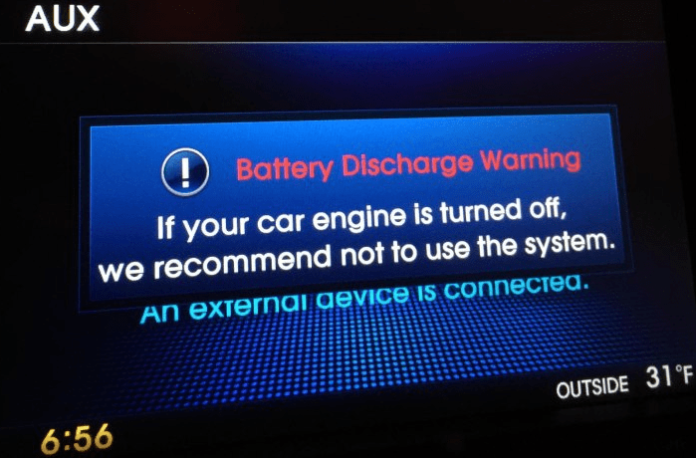Battery Discharge Warning Hyundai are a frequent problem that many car owners, especially Hyundai owners, deal with. These alerts suggest that the car’s battery is running low and might not start or function properly. Maintaining the functionality and lifespan of your Hyundai car depends on your understanding of the reasons behind these alerts and how to handle them. This post will explain what a battery discharge alert indicates, why it occurs, and how to fix any associated problems.
Table of Contents
What Does a Battery Discharge Warning Mean?
When the battery voltage in a Hyundai car falls below a predetermined level, a Battery Discharge Warning Hyundai is usually shown on the dashboard. The driver is made aware of any problems with the battery or charging system by this notice. When the battery is discharging, it implies that the electrical energy contained in the battery is being depleted faster than it is being restored by the alternator or charging mechanism.
Signs of a Battery Discharge Warning
The alert may appear in a number of ways, including:
- Warning Light: The dashboard may display a battery icon or a “Battery Discharge Warning Hyundai” message.
- Dimming Lighting: Both external and interior lighting may seem less bright than usual.
- Electrical Problems: Automobiles may have issues with infotainment systems, locks, or power windows.
- Difficulty Starting: After being parked for a long time, the car may have trouble starting.
Typical Reasons for Warnings About Battery Discharge
Hyundai cars may display a Battery Discharge Warning Hyundai due to a number of reasons. Drivers who are aware of these factors are better able to take preventative action and resolve problems quickly.
- A worn-out or aged battery: Batteries lose some of their capacity to store a charge with age. The average lifespan of an automobile Battery Discharge Warning Hyundai is three to five years, contingent upon usage and environmental factors. Your battery may struggle to keep a charge as it gets closer to the end of its life, which could result in discharge alerts.
- Malfunctioning switch: While the engine is running, the alternator is in charge of charging the battery. A discharge warning could appear if the alternator is not performing properly, which would prevent the battery from receiving a sufficient charge. Dimming of the lights and strange sounds coming from the engine area are signs of a malfunctioning alternator.
- The Paralytic Drain: while electrical parts keep drawing power from the battery even while the car is not running, this is known as a parasitic drain. Interior lights, alarm systems, or improperly placed aftermarket electronics are common culprits. If this constant drain is ignored, a Battery Discharge Warning Hyundai may appear.
- Severe Weather: The performance of batteries can be greatly impacted by extreme temperatures. Batteries may lose their capacity to hold a charge in cold temperatures, while internal damage may result from extreme heat. A discharge warning may result from either circumstance.
- Battery Terminal Corrosion: The ability of the battery to supply energy to the vehicle’s electrical system may be impeded by corrosion on the battery terminals. Warnings about inadequate charging and discharge may result from this problem. Battery terminal cleaning and maintenance on a regular basis can help avert this issue.
How to Address a Battery Discharge Warning
As soon as your Hyundai displays a Battery Discharge Warning Hyundai, you should act quickly to avoid more problems. To successfully address the warning, follow these steps:
- Examine the condition of the battery: Examine the battery for indications of deterioration, corrosion, or wear. Replace the battery if it is getting old or exhibiting symptoms of failure. To assist you assess the health of your battery, the majority of auto parts companies provide free battery testing.
- Examine the generator: Get an expert to test the alternator if you think it might be the problem. A malfunctioning alternator will not charge the battery sufficiently, which could result in discharge warnings.
- Examine the parasitic drain: If the battery and alternator are performing well, consider checking for parasitic drains. After disconnecting the battery, measure the current draw with a multimeter. If the draw is higher than usual (usually less than 50 milliamps), look into the matter more to determine the cause of the drain.
- Tidy Battery Terminals: Make sure there is no rust on the battery terminals and that they are clean. After cleaning the terminals with a wire brush and a solution of baking soda and water, firmly reattach them.
- Get Expert Assistance: It is advisable to get help from a certified mechanic or a Hyundai shop if you are unable to locate or fix the problem. They are able to precisely identify the issue and suggest the necessary fixes.
Conclusion
In a Hyundai, a Battery Discharge Warning Hyundai is not something to ignore. You can guarantee that your car runs smoothly and avoid more problems by being aware of the possible causes and acting quickly to address them. You can keep your Hyundai operating smoothly for many years to come by doing routine maintenance, which includes battery checks and electrical system inspections. This will help you prevent Battery Discharge Warning Hyundai. Never forget that keeping your car dependable and long-lasting requires paying attention to these indications at the earliest possible moment.




